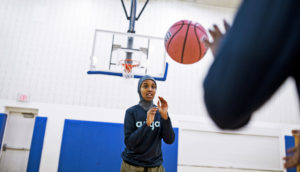Fatimah Hussein was born in Somalia and immigrated to Minneapolis when she was 6 with her family, fleeing civil war. Ms. Hussein and her sister played softball when they were young, but in middle school they stopped, as did many of their Muslim peers. “It was not normal to see girls playing sports,” she said of her childhood.
“You’d see boys continuing to play and getting support by the parents,” said Ms. Hussein, now 29 and a social worker. “It’s not that my dad ever said, ‘You can’t play,’ but we just never got that encouragement.”

Another impediment was that Ms. Hussein and her sister wore hijabs, the scarves that many Muslim women and girls use to cover their heads, ears and necks. The garments are typically made of thick fabric that wraps around the neck; some hijabs require pins as fasteners. On the playing field, hijabs are prone to unraveling, and they can be hot and unwieldy. Sometimes they’re even dangerous — other players could trip on them if they unravel, or the pins could jab the wearer or others.
During her childhood Ms. Hussein said she was preoccupied by thoughts of “this doesn’t look right, this is falling, I don’t feel comfortable inside.”
Eight years ago, she realized that the young girls she worked with at a Minneapolis community center shared those feelings, so she founded the Girls Initiative in Recreation and Leisurely Sports, or Girls, a program that provides girls-only gym time at the center.
The Asiya hijabs are made of a lightweight, sweat-wicking fabric, and they come in three styles with varying degrees of coverage. They don’t require wrapping or pins because they’re snug-fitting with built-in headbands that further secure the fabric.
For Ms. Hussein, who works full-time as a social worker and had no business background, the transition into entrepreneurship presented a steep learning curve. A small corps of businesswomen in Minneapolis, along with a state senator, swooped in to help bring her product to market. Asiya’s story shows how mentors can be integral to a new business’s growth.
Read more: Putting Faith and Sports on the Same Team
Source: NYtimes


